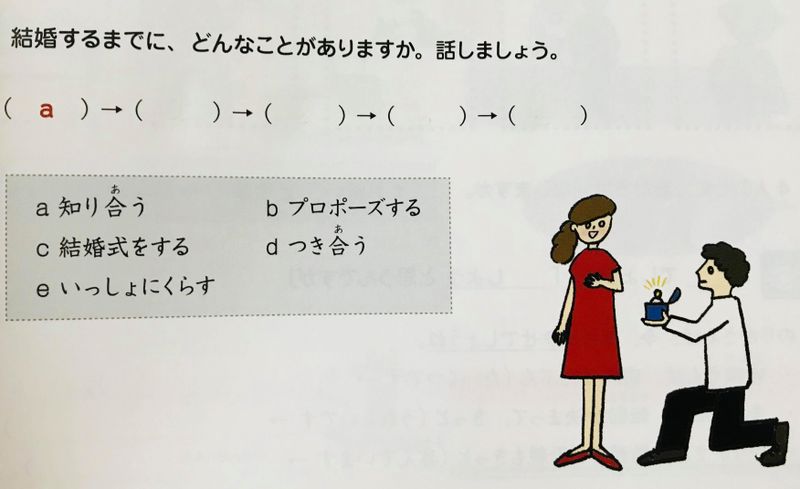Sep 8, 2018
Wait, you don´t think like a Japanese?
While I was studing at a Japanese language school in Tokyo, we had mostly daily a Japanese test. Sometimes it was very tiring to do every day a test, especially if the context was always the same. But sometimes I couldn´t get 100 points even I knew all the vocabulary and grammar. The problem was not a lack of Japanese, than more a lack of not thinking like a Japanese.
One of the test questions can be seen in the following picture:
You are supposed to put the vocabulary for meeting a person in the right order. It sounds very easy, but I´ve got scold by the teacher, that my answer is totally wrong.
Right:
知り合う -> 付き合う -> プロポーズする -> 結婚式をする -> 一緒に暮らす
To get to know somebody - > getting friends -> proposal -> marriage -> living together
Wrong:
知り合う -> 付き合う-> 一緒に暮らす -> プロポーズする -> 結婚式をする
To get to know somebody - > getting friends -> living together -> proposal -> marriage
Actually I just put living together before marrying, which should be the right order for me. Why shall I marry somebody, before knowing how it is to live together. My teacher was kind of frightened of my answer. Still in Japan it is not so common to live together before you marry.
The second example was also a kind of me having a different thinking than Japanese. I had to choose in which season you are wearing different kind of shoes. When I answered sandals for summer and autumn, I´ve got again 0 points. I was very confused and frustrated about that. For me the Japanese autumn is still very warm (often up to 28 degree even in November), that´s why I wear open shoes mostly till the end of November. Unfortunately that is not very common in Japan. As soon as the calendar says autumn people here are changing to long autumn clothes, even we still have 30 degrees outside.
Do you also had such experiences in Japan?
I´m a german girl living in the center of Tokyo, but my true love belongs to the countryside of Japan (especially Chiba and Hokkaido). I love traveling in Japan and explore hidden areas.
I want to help people with my articles to get in touch with the Japanese culture and all the beautiful places you can explore.
Follow me on IG https://www.instagram.com/nihonbluebutterfly/?hl=de
Besides traveling around, I love trains, handcraft and my little rabbits.



6 Comments
TonetoEdo
on Sep 8
Your teacher forgot some vocabulary. Here, I’ll fix it for your teacher - 知り合う -> 付き合う -> プロポーズする -> 結婚式をする -> 一緒に暮らす-> 離婚 -> 再婚 There’s unfortunately also 未亡人. The idea of marriage starting with a love match is recent in Japan. I know people in their sixties who were introduced and only got to know their spouses after marrying. Lots of people in Japan live together without marrying. I know a few Japanese couples who have lived 同性, cohabiting without formally marrying. A lot of people choose to live together before the formal marriage ceremony. Not to mention same sex couples... There is a lot of diversity here apparent when you get to know Japanese people.
helloalissa
on Sep 8
Haha, yeah, maybe this is the old fashioned 'correct' answer to how we 'should' get married, but it's not realistic. TonetoEdo is correct that some people had a sort of arranged marriage. I recently heard from a student who was married this way, maintains his family life with adult children, but has a girlfriend and his wife encourages it.
JapanRamen
on Sep 9
I'd like to recommend to your teacher the very heart-warming and realistic manga series called 喰う寝るふたり 住むふたり (Kū Neru Futari Sumu Futari), which is about a couple who lived together for years before getting married and how they sorted out their differences along the way. Marriage is constantly on the line in the manga as all their friends go "you two are still not married yet!?", but from reading it, perhaps your teacher will realize that life isn't about living out a sequence that was taught to her, as happiness (and human lives) can flourish in many different ways. Also, amazing that she's a language teacher for people of other cultures, yet so has so little room to accept other ways of thinking without scolding you for it.
JapanRamen
on Sep 9
Just found that the manga was made into a TV drama as well ;)
edthethe
on Sep 11
I'd have gotten this so wrong!!!
TonetoEdo
on Sep 12
@Jackson The manga title is a great tip! I'll check that out. I have something to admit about narrow-minded thinking as a teacher. I taught English full time to immigrants and international students in my home town before I had experienced world travel in my adult life, or lived in a different culture. I think I, too, had some preconceptions about life. I think I made assumptions about language learning and living in another culture until I experienced life abroad and being an adult learner of a language, here in Japan. Here I was on the receiving end, learning Japanese from teachers who hadn't mastered a second language, or lived abroad. They asked me questions that showed their preconceptions about foreign residents and de facto immigrants here in Japan. I kind of withered inside, knowing I had said similar stupid things. There's nothing like living in another culture and language to think outside the box.